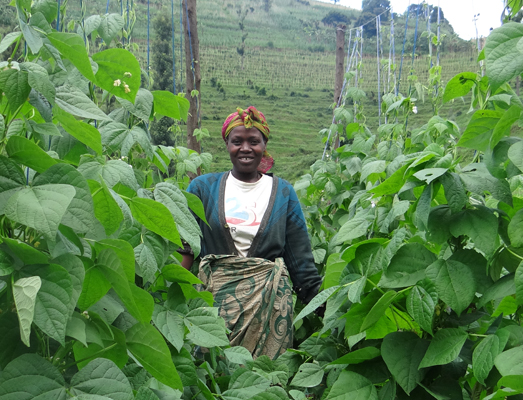Smallholder farmers in Rwanda are challenged by low farm productivity, a reality compounded by the impacts of climate change, population growth, and other crises. To help address food and nutrition insecurity among the country’s most vulnerable communities, it is vital that solutions that increase farmers’ crop productivity, livelihoods, and household nutrition are implemented.
Beans are a staple food for Rwandans, often eaten six days a week in significant quantities, especially among rural households. Rwandans have the highest per person bean consumption in the world, characterized by a local adage: “a meal without beans in Rwanda is like a meal without food”.
Micronutrient malnutrition affects 37 percent of children under the age of five years old in Rwanda, and nearly 20 percent of women are anemic. Any advances in the nutrient content or yield of beans grown in Rwanda can thus have widespread impact. However, limited access to agricultural technology including improved bean seeds and inputs such as fertilizers have perpetuated the country’s low productivity and frequent food shortages.
Nutrient-enriched iron beans were developed as a solution to increase the availability of essential iron in diets of populations that primarily rely on crops grown locally for their daily sustenance. Nutrition traits were prioritized alongside other non-negotiable and farmer-preferred traits such as high yield when breeders developed the biofortified seed varieties.
A study published in Food Security evaluated the impact of growing high yielding iron beans compared to other local non-iron beans to determine the impact on farmers’ yields and incomes. Data was collected from 1,397 farming households from across 120 villages following the bean harvest in June and July of 2015.
Results revealed that the adoption of iron bean seeds resulted in significantly greater grain yields (23 percent for bush beans and 22 percent for climbing bean types), and higher potential incomes (27 percent for bush beans and 23 percent for climbing bean types) compared to farmers who grew beans that were not biofortified. The increases in agricultural incomes were equivalent to USD 84/Ha and USD 110/Ha for bush and climbing beans, respectively.
The study also considered other factors related to agricultural productivity including farmers’ proximity and travel time to local markets. Farming households located closest to markets benefited more in terms of improved incomes from growing iron beans than the households in isolated rural areas.
Previous studies have shown that iron beans are a good source of iron and can improve cognitive and physical performance among vulnerable populations. Consumer acceptance studies have also shown that consumers prefer the sensory attributes of improved iron bean varieties as much as, if not more than, they prefer those of popular local varieties.
There is a strong and sustained demand for iron beans in Rwanda owing to the seed’s high productivity. HarvestPlus, the International Center for Tropical Agriculture (CIAT, now the Alliance of Bioversity International and CIAT), and the Rwanda Agriculture and Animal Resources Development Board (RAB), initiated development of iron bean varieties for Rwanda in 2003. Delivery to smallholder farmers began in 2012 and by the end of 2018, iron beans accounted for an estimated 20 percent of all beans produced by Rwandan farmers, with an estimated 420,000 smallholder farming households growing them. About 15 percent of the population are regularly eating them – and the iron bean seed and grain markets continue to gain momentum.
This recent study confirms that growers of biofortified iron beans achieve significantly greater yields and incomes than those who plant other bean varieties. Data analyzed indicate that at the national level, the productivity from iron beans from the single growing season added an estimated USD 2.5 million to the Rwanda economy.
These findings are important for breeding and delivery programs and can aid policy-makers in identifying geographical areas for scaling up investment to tackle ongoing food and nutrition insecurity.
Learn more: Funes, J., Sun, L., Benson, T. et al. Cultivating prosperity in Rwanda: the impact of high-yield biofortified bean seeds on farmers’ yield and income. Food Sec. (2024).
